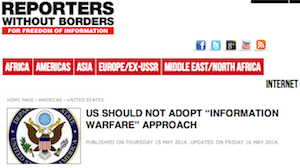BBG Watch Commentary
 “We urge the US authorities not to transform media such as Voice of America, Radio Free Europe and Radio Free Asia into diplomatic communication tools,” said Reporters Without Borders secretary-general Christophe Deloire.
“We urge the US authorities not to transform media such as Voice of America, Radio Free Europe and Radio Free Asia into diplomatic communication tools,” said Reporters Without Borders secretary-general Christophe Deloire.
What we find missing in the RSF article is any mention of the near destruction of news reporting at the Voice of America (VOA) by the current VOA management and various actions by both VOA executives and officials of the Broadcasting Board of Governors’ (BBG) International Broadcasting Bureau (IBB) to close down numerous VOA language services and news programs to such information-denied countries as China, Tibet, Russia, Iraq and many others.
The congressional bill, United States International Communications Reform Act of 2014 (H.R. 4490), which has already been unanimously approved in a fully bipartisan action by the House Foreign Affairs Committee and sent to the whole House for consideration, indeed contains some worrying language, but it also includes key elements of the VOA Charter, and is designed to address mismanagement at the Voice of America, which in the opinion of many represents a far greater threat to VOA’s journalistic independence, its effectiveness, and its very existence.
In response to a multitude of news omissions, violations of the VOA Charter, and news reporting mistakes in recent years and months, Rep. Matt Salmon (R-AZ), a member of the House Foreign Affairs Committee, has announced his intention to introduce a bill that would eliminate federal funding for the Voice of America entirely.
Rep. Salmon described his initiative to defund VOA as the fifth “Shrink Our Spending” (SOS) bill in a series of bills to be introduced over the next few months to cut wasteful and duplicative spending.
H.R. 4490 introduced by House Foreign Affairs Committee Chairman Edward Royce, with Committee Ranking Member Eliot Engel and seven other co-sponsors, would not abolish the Voice of America but would subject it to much stricter management controls. Some, including RSF, fear that some of these controls may also limit VOA’s journalistic independence.
But there is also a major problem with mismanagement at the Voice of America. Reporters Without Borders never complained when numerous VOA journalists were being laid off and their programs were being terminated. RSF also did not complain when dozens of Radio Liberty journalists in Russia were unjustly fired in 2012 by the former Radio Free Europe / Radio Liberty (RFE/RL) management. Some of these brave journalists were later reinstated but not due to any help from RSF, even though RSF had been approached and asked to intervene. It did not. We would not be surprised if some of the IBB executives who had allowed the mass firing of Radio Liberty journalists to happen in Putin’s Russia two years ago got now RSF to issue its statement. Their IBB bureaucratic jobs are at stake if the bill is approved by Congress and signed into law by the President.
Reporters Without Borders did complain in the past when individual VOA and RFE/RL journalists were being harassed or detained abroad and VOA or RFE/RL rebroadcasts were being taken off the air by foreign governments. RSF, however, failed to acknowledge the significant threat to VOA and RFE/RL journalists and their independence from their own dysfunctional management. RSF also did not intervene when a VOA government official tried to get the UN to withdraw press accreditation from an independent American journalist. These are some of the many abuses at VOA which the congressional bill is trying to address. The bill is not perfect, but it is more than 95% correct in its findings and remedies.
RSF is commenting now, although it got some of its facts wrong about the bipartisan congressional bill. The bill is actually likely to strengthen the independence of Radio Free Europe / Radio Liberty and Radio Free Asia (RFA). Some of the administrative reforms proposed in the bill are likely to be very good for BBG journalists and provide them with greater independence from bureaucrats. The bill is also likely to give journalists more resources now being swallowed by the bureaucracy and make their jobs more secure in the long run.
It’s good, however, that RSF did issue this statement on the integrity of news reporting, although we also hope that the bill will become law with some modifications. RSF should keep a closer eye on U.S. international broadcasting and continue to comment if there are no administrative reforms at the BBG. If the bill is not passed, IBB and VOA executives will continue to eliminate critical programs to countries without free media and fire journalists while expanding their bureaucracy.
This kind of mismanagement is what the bipartisan bill is trying to address. We hope that the Congress will pass it with appropriate modifications to establish the central role of the VOA Charter and integrity of VOA news. In general, we do not disagree with the Reporters Without Borders statement.
Comments are closed.